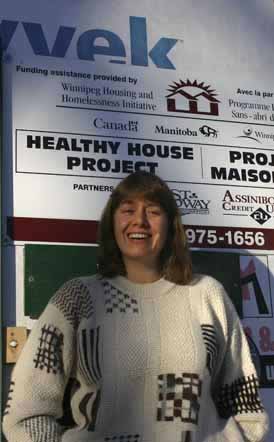Canadian Mennonite
Volume 10, No. 06
March 20, 2006

Klassen’s gold will ‘last forever’
Winnipeg
 |
Canada’s 2005 female athlete of the year must be first in line for the award again this year. Winnipeg’s Cindy Klassen—the pride of Mennonites and Mennonite Brethren on both sides of the 49th parallel—set a Canadian Olympic record in Turin, Italy, last month, bringing home five speed skating medals, one in each of the events she entered.
Klassen skated to long-track gold in the 1500-metre event, earned silver medals in the 1000m and as a member of Canada’s team pursuit foursome, and brought home two bronze medals in the 3000m and 5000m long-distance races.
If that wasn’t enough, a week after the Olympics, Klassen travelled to the Netherlands, where she set a 3000m track record, which allowed her to claim the World Cup title in that distance.
Klassen returned to Canada on March 6, where she and other members of Canada’s speed skating team were met by adoring fans in Calgary. With her five medals around her neck, she told reporters, “It’s awesome to be home,” adding, “I just want to sleep in my own bed.”
Even before her return to Canada, it was announced that Klassen had signed a promotional deal with Manitoba phone company MTS Allstream Inc. According to the Winnipeg Free Press, the five-year deal is worth $1 million. A phone company release explains that the 26-year-old speed skating phenom “will represent MTS at various events and participate in upcoming marketing campaigns.”
Of the announcement, Klassen said (on her website cindyklassen.com), “I am so very proud to be a Manitoban, and am thrilled to be able to partner with MTS.” She later added, “I’m not going to have to get help from my parents anymore. I can just relax and focus on my training.”
Klassen intends to continue skating until at least the 2010 Winter Olympics in Vancouver.
Before heading to Turin, Klassen described herself as “very competitive, a fighter, and pretty determined.” Yet, while winning is important to her, she knows there is more to life than skating. “As long as I’m doing God’s will,” she said, “it will be okay.”
She went into the Olympics with the enthusiasm and encouragement of her family and community behind her, asking supporters to pray for good health to compete and that God would remain first in her life.
“Olympic competition is tougher mentally,” she said. “There’s more pressure, more media hype, more at stake. The whole world is watching.”
As a young girl playing hockey in a boy’s league, Klassen knew she would go to the Olympics one day. Her certainty that this was God’s plan for her life was bolstered by the announcement that, for the first time, the 1998 Olympics would hold a women’s hockey event. The timing couldn’t have been better for Klassen, who graduated from high school in 1997. So it came as quite a shock when she didn’t make the team.
She wasted little time on disappointment, however. She transferred her exceptional abilities to speed skating, where she discovered the lessons learned from tough hockey coaches—like “the drive to go really hard”—stood her in good stead as she stuck with the training and quickly rose to a competitive level.
In 2001, Klassen was surprised to come fourth in a world championship. “I was pretty new to the sport, and still learning,” she said of the experience. Her success there gave her confidence in the next race, and the next. A year later, Klassen arrived at the Salt Lake City Winter Olympics, where she won a bronze medal.
Klassen truly loves what she does. “When I go out to skate, it hits me how fortunate I am,” she said. “I’m thankful for everything God has given me.” When workouts are really hard, she remembers that “God has given me this gift to be able to skate and race, and he wants 100 percent of me.”
Confidence in God’s love for her transcends winning or losing. In times of peak performance as well as times of injury, Klassen claims the promises of Psalm 16:8: “I have set the Lord always before me. Because he is at my right hand, I will not be shaken.”
Klassen often listens to Steve Bell’s recording of this psalm, “I Will Not Be Shaken.” It helps her focus before a race and reaffirms God’s care for her. “When I go to the line and race, I don’t have to worry about anything because it’s all in his hands. God is on my side.”
In her racing, as in her faith, Klassen takes comfort in I Corinthians 9:24-25: “Do you not know that in a race all the runners run, but only one gets the prize? Run in such a way as to get the prize. Everyone who competes in the games goes into strict training. They do it to get a crown that will not last; but we do it to get a crown that will last forever.”
The house that Ruth built
Winnipeg
 |
Ruth Rempel isn’t just about teaching responsible living and caring about needy people—she wants to live it too.
“I want to live in a way that is consistent with what I teach and believe,” says Rempel, who teaches international development studies at Menno Simons College, Canadian Mennonite University’s downtown campus at the University of Winnipeg.
For Rempel, this means living within walking distance of work and church. It also means building one of Winnipeg’s most energy-efficient and environmentally friendly houses.
The 1,500-square-foot house, which is still under construction, is located on a formerly vacant lot in the West Broadway section of the city’s downtown area. The goal of the house—which is an experimental project supported by the City of Winnipeg, the province of Manitoba, the federal government and the West Broadway Development Corporation—is to show that it is possible to build affordable, energy-efficient housing.
“We want to give builders some ideas for how they can make new houses more energy efficient,” she says. “The house is part of an effort to show that energy-efficient housing isn’t only for the well-to-do.”
Rempel, who has not yet lived in her house for a full winter, estimates that her heating bills will be about $40 to $50 per month. She will know the exact cost of winter heating in the spring, when the results of a study done by a local community college come in.
The heating bills are low for a number of reasons, including the fact that the house doesn’t have a furnace. This may seem pretty crazy in a place like Winnipeg, where, as everyone knows, it gets really cold in winter. Rempel’s heating system pumps hot water through coils underneath a ceramic tile floor. An open-concept design uses convection to allow the heat to flow throughout the house. In summer, the process is reversed; the floor stays cool, and windows beneath the roofline allow the hot air to escape at night.
“It’s like the house is breathing,” she says, noting that she doesn’t need an air conditioner.
Other ways of keeping the house warm in winter are lots of energy-efficient triple-pane windows to let in sunlight, and cellulose insulation.
“It’s basically recycled shredded paper,” says Rempel of the insulation. “If it’s installed correctly, it’s a far better insulator than fibreglass.”
Other environmentally friendly devices include a low-flush toilet that uses rainwater in summer; rainwater that runs off the home’s metal roof is collected in a cistern near the bathroom, using gravity to fill the toilet tank. (In winter, Rempel’s toilets connect to the city’s water supply.)
In addition to being energy-efficient, the house is also healthy.
“Indoor air can be shockingly bad,” she says.
To keep the air in her house as clean as possible, Rempel uses tiles and wood for flooring; there are only a few throw rugs here and there. She also uses steel-framed cupboards and cabinets made from strawboard.
“Many cupboards are made of materials that give off harmful gases,” she says. “You might as well stick a bucket of formaldehyde in your kitchen if you use those.”
In addition to building a house that shows her concern for the environment, Rempel has also used local manufacturers and products as much as possible. “That’s been an important principle for me right from the beginning,” she says. “I want to help create employment for local people.”
For Rempel, all these things add up to a practical way of showing her faith. “I like the idea of living with a smaller ecological footprint, and contributing to urban revitalization,” she says, adding that the project has made an impression on her students. “Through this project they can see that faith is more than just going to church on Sunday. It’s about how you live your life all through the week, and the choices you make about where you live and the house you live in.”
In addition to being a testimony to her students, and an example of what new urban housing can look like, Rempel also wants to show others that living in an environmentally friendly way can also result in an esthetically pleasing house.
“Living in a way that shows concern for the environment isn’t the equivalent of eating oatmeal with nothing on it,” she says. “Living simply doesn’t mean you have to live ugly.”